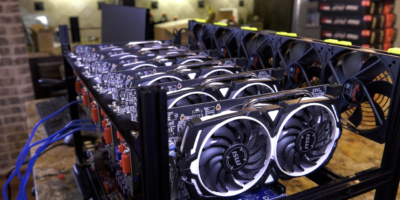
Former SEC Chair Anticipates Inevitable Approval of Spot Bitcoin ETF Despite Delays The United States Securities…
You're reading
Posted at September 7, 2023 | Post by Victor Rollman
According to Andrew Webber, CEO of Digital Power Optimization, the profitability of renewable energy could be significantly increased, and Bitcoin mining plays a pivotal role in achieving this goal.

Webber, the founder of a New York-based company specializing in assisting energy firms in establishing crypto mining operations, believes that Bitcoin mining has the potential to promote greater investment in renewable energy. This is due to its ability to utilize “stranded” energy generated from sources like solar and wind power. In an interview with Forkast, Webber explained that making renewable energy more profitable will encourage increased construction of renewable energy facilities.
The following Q&A has been edited for clarity and length.
Timmy Shen: Could you provide more information about your company and your collaboration with energy firms?
Andrew Webber: We leverage flexible data centers, Bitcoin mining, or flexible AI (artificial intelligence) computing to deploy assets and operations at energy sites where power is generated, such as wind, hydropower, or solar power. We harness surplus energy or energy that would otherwise be undervalued or stranded in remote locations due to insufficient transmission infrastructure. By deploying flexible data centers at these generation sites, we enable energy producers to manage their power consumption versus the amount they sell to the grid. This creates a highly profitable off-take scenario where they can capture additional value from their energy.
We view this entire ecosystem as an integrated strategy that will be adopted by the energy sector. It’s similar to how they approach battery deployments or green hydrogen production to utilize excess available energy for electrolyzing water and producing hydrogen as a fossil-free fuel.
Shen: How do you determine when to activate or deactivate computing power?
Webber: The decision primarily rests with our partners, but we assist them in making that determination. Essentially, you can continue running your data center based on grid prices. If the grid prices or the opportunity cost of selling that power exceeds what you can earn by using it for your data center, you simply turn off the data center, redirecting the excess power into the grid.
For instance, during the 2021 winter storm in Texas, grid prices surged due to high demand and insufficient generation. Bitcoin miners turned off their operations because they didn’t want to operate when power prices were exceptionally high. Instead, they chose to sell their power to the elevated market to maximize their profits while simultaneously providing the grid with the additional power it needed to stabilize prices. As a load-balancing mechanism, it proved to be highly effective in meeting society’s demands.
Shen: How profitable is Bitcoin mining, and what factors influence miners’ decisions to turn off their machines?
Webber: Bitcoin mining profitability is primarily determined by the spot price and network difficulty, which are closely related. These two factors are critical in deciding when and how a flexible data center should operate in relation to grid prices.
Shen: Is there a specific Bitcoin price threshold you recommend to your clients for turning off their machines?
Webber: It depends on how network difficulty responds to the spot price. If Bitcoin’s price reaches a million dollars, miners may initially see significant profits, but competition will intensify, eventually returning profits to their current levels. Conversely, if Bitcoin’s price drops to $10,000 or $5,000, many miners may become unprofitable and forced to shut down their operations. However, those that remain operational will earn more Bitcoin, creating a balancing effect.
There is no definitive “magic number” or level at which Bitcoin mining becomes unfeasible. It all depends on understanding the relationship between flexibility, uptime, power costs, and profitability.
Shen: Many miners faced challenges last year due to low Bitcoin prices and high energy costs. How has the rising Bitcoin price impacted the mining industry?
Webber: While there has been a modest increase in profitability, the costs of equipment have also changed. The entry cost to participate in this market fluctuates, as equipment prices, profitability, and energy costs vary. The rising price of Bitcoin has brought some investors back into the space, instilling more confidence that Bitcoin is here to stay. For miners operating on an institutional scale, daily fluctuations in Bitcoin’s spot price matter less because equipment prices reflect current-day realities.
In summary, Bitcoin’s price matters, but not as much as one might think.
Shen: How do you persuade your clients to partner with you? What opportunities and challenges does the crypto mining industry face, and why should the energy sector consider entering Bitcoin mining?
Webber: Regulatory considerations are crucial, even more so than economic returns. The ability to absorb excess power at generation sites is highly appealing to energy companies once they understand the concept.
The lack of regulatory clarity has slowed down the industry, especially in the United States, despite the abundance of surplus power and ongoing renewable energy developments. Energy companies are cautious because they operate in a heavily regulated industry and do not want to jeopardize their relationships with energy regulators.
Over the next decade, I foresee more renewable energy being generated through Bitcoin mining than people currently realize. This approach will become a vital tool for making renewable energy assets more viable, increasing efficiency, and reducing waste by utilizing all available energy. A significant amount of energy is curtailed, where solar or wind farms are turned off because they produce more power than needed. Bitcoin mining can help rectify this issue and contribute to a smoother transition from fossil fuels to green energy.

Curious about Bitcoin?
How about mining this new and asymmetric asset?
Find out how it works.
Book your edge now!
www.rollmanmining.com

Former SEC Chair Anticipates Inevitable Approval of Spot Bitcoin ETF Despite Delays The United States Securities…

Introduction As we venture further into the digital age, the cryptocurrency mining industry continues to evolve…

A comprehensive X thread by Bitcoin developer and observer 0xB10C has uncovered that several prominent bitcoin…